It is 6:30 on a Sunday morning, and I am in the middle of the road, crying.
Over a stick.
I found my walking stick a few days ago, on the side of the trail just outside of Aosta, and promptly named it Dumbledore’s Staff because carrying it made me feel like a strong and noble wizard. It made me feel fearless. It made me feel like I really could walk 1000 kilometers, that I could walk all the way to Rome.
Together we made our way through Aosta Valley and across the rice fields surrounding Vercelli. Dumbledore’s Staff held me up — literally — as I crept over uneven and sometimes rocky mountain trails and held me up — figuratively — under the blaze of the sun when I felt like I couldn’t walk one step further.
But this morning, when I left the room where I was staying in Palestro, I accidentally forgot my stick. Now, back on the dusty road, nothing open, the houses still asleep, I realize there is no way to get back inside. There’s nothing I can do but keep walking and leave Dumbledore’s Staff behind.
I quickly text my friend Caty in California. She’s previously walked the Camino Santiago, and I know she’ll understand. Plus, thanks to the beauty of time zones I know that she’ll be awake.
“Of course it’s upsetting,” Caty immediately responds. “Stick love is real.”
Later in the morning, I find another stick atop a pile of rubbish. This stick is long and crooked and full of sharp nubs. Its bark is uneven, peeling. Half covered in garbage, it looks, well, it looks sad. Lonely. I think, If I were a stick, this is what I would look like. I name my new stick Junior and continue walking.
It may take awhile, but I know that Junior and I will eventually find our own rhythm.
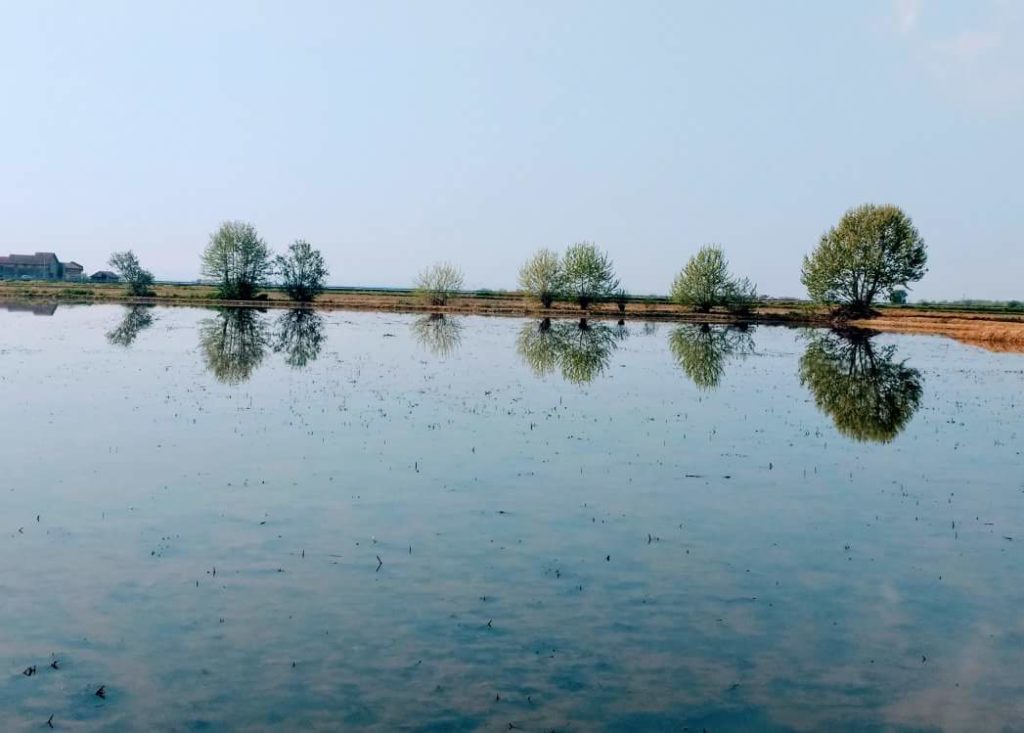
I’ve long been a walker and a hiker. A roamer. But walking long distance is different from taking a stroll through your neighborhood. It’s life-altering. It makes you aware of the language of your body. It connects you to the earth and establishes your place in the universe. It changes the way you witness life and the way you exist in the world.
Walking is a basic activity, one that most of us have done since we were toddlers, when we transformed from crawling like drunken turtles into wobbling like drunken linebackers. As we grew we became more steady on our feet. We gained confidence with our balance and movement until nothing could hold us back. Walking signed the permission slip we needed to explore.
Our world back then may have been limited to our homes or our backyards or the handful of blocks surrounding our neighborhood, but to us that world felt infinite. As children we knew we could explore the corners of an attic or a playground or an alleyway. We weren’t afraid to burrow into the dirt or behind a bush or under a pile of rocks. Everything was a source of curiosity, of discovery.
With walking, anything became possible.
But for most of us, as we age walking loses its magic. Instead of being a means of discovery, walking becomes yet-another mundane task in the day, a means to an end rather than something expansive.
As an organic form of transport walking costs no money and requires little maintenance, but for many it is a burden, an activity that we go out of our way to avoid. Walking is time-consuming. What matters is arriving at our destination as quickly and effortlessly as we can so we can quickly and effortlessly move on to the next stop. We aim our cars for the closest parking spot at the mall, we step onto moving walkways to avoid walking even a few feet at the airport, and rather than explore a new landscape on foot, we climb into planes, trains, and automobiles to do the work for us.
While modern transportation does make it easy to get from Point A to Point B, and while it expands the distance we can travel, the convenience of transportation erases our sense of connectivity to the world that passes beneath us as we zoom along in a metal compartment, often with barely a glance through our windows to the passing scenery. Modern travel isn’t as much about travel as it is about speedily transporting the body to the chosen destination.
In her book, Wanderlust: A History of Walking, Rebecca Solnit cites Wolfgang Schivelbusch’s book, The Railway Journey, where he claims: “The train was experienced as a projectile, and traveling on it as being shot through the landscape–thus losing control of one’s senses…The traveler who sat inside that projectile ceased to be a traveler and became…a parcel.” Train travel — and as Solnit later points out, airplane travel — ceases to be an active verb for the traveler. There is no work involved, no real physical challenge to the journey itself. The traveler instead becomes a mere passive object to be hurled through time and space from one location to another; she does nothing to get herself there beyond purchase a ticket and show up.
What happens to our experience as travelers when the journey itself is essentially irrelevant to the destination? What happens when we disengage from the physical process of getting there? How can walking help us re-engage with our selves and the larger world?
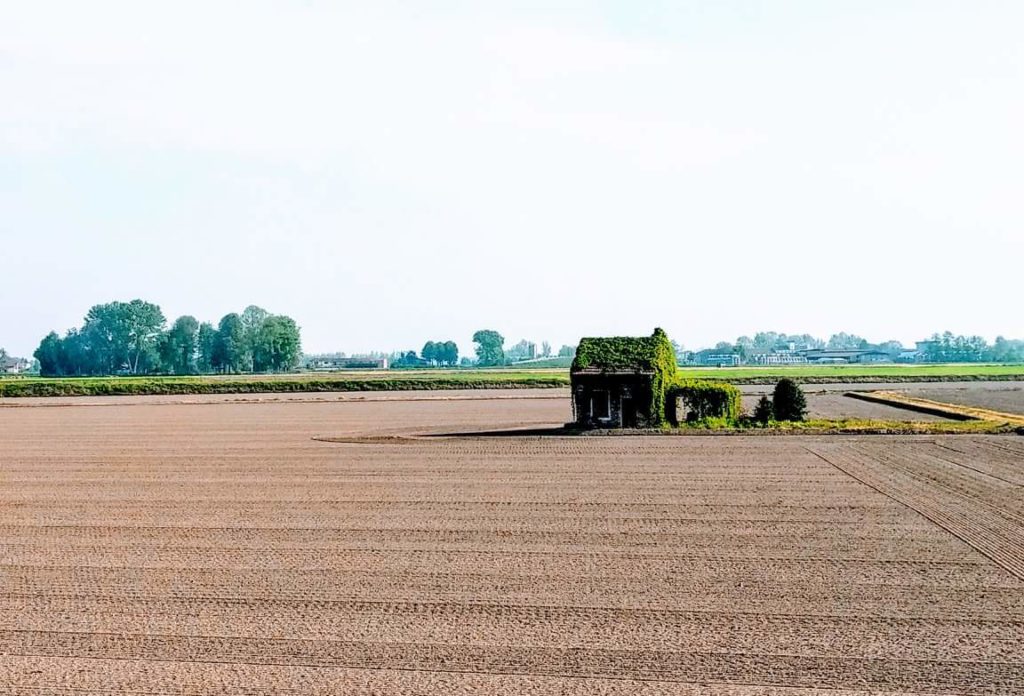
When you walk, the journey and the destination are inextricably linked. When you walk, you become aware of every flower, pebble, and speck of dirt. A broken fence. A cigarette butt. An abandoned rusty truck. You witness the landscape as it changes over the course of a day, a week, a month. For the walker, every moment becomes a moment of discovery.
As you pass equally through garbage-strewn overpasses and wildflower-strewn mountainsides avoidance is impossible; the complexity of a world comprised of multiple layers emerges. Some of it is beautiful, some of it is boring, and some of it is downright ugly. The world of the walker is not simply a postcard-perfect place of arrival.
At first the experience of long-distanced walking is a bit surreal. One day you walk seventeen miles and then twenty the next. You are at first conscious of the absurdity of it all. Wake up, fuel, walk, fuel, walk, arrive, bathe, stretch, fuel, sleep, repeat.
But soon walking becomes the axis of your existence; it becomes the only thing that matters, the only thing you do. Soon this new rhythm of life becomes natural, the simplicity of waking up, organizing your pack, lacing your boots, and walking out the door. There is no contemplation or strategy. There is only the simple act of doing it. The destination — of the day, of the entire journey — is almost an afterthought. The only thing that matters is this road, this step, this moment. This river to cross. This pebble beneath your sole. This flower on the side of the road.
In Wanderlust, Solnit claims that: “Walking, ideally, is a state in which the mind, the body, and the world are aligned, as though they were three characters finally in conversation together, three notes suddenly making a chord.” As I walk, I become aware of every thought and every cell and the relationship between my self and the world. I become aware of my body’s limitations but, more important, of just how much it can do, of how far I can go. Ultimately, walking becomes a harmonious act, one that simultaneously grounds the walker in reality and helps her transform that reality into something extraordinary.
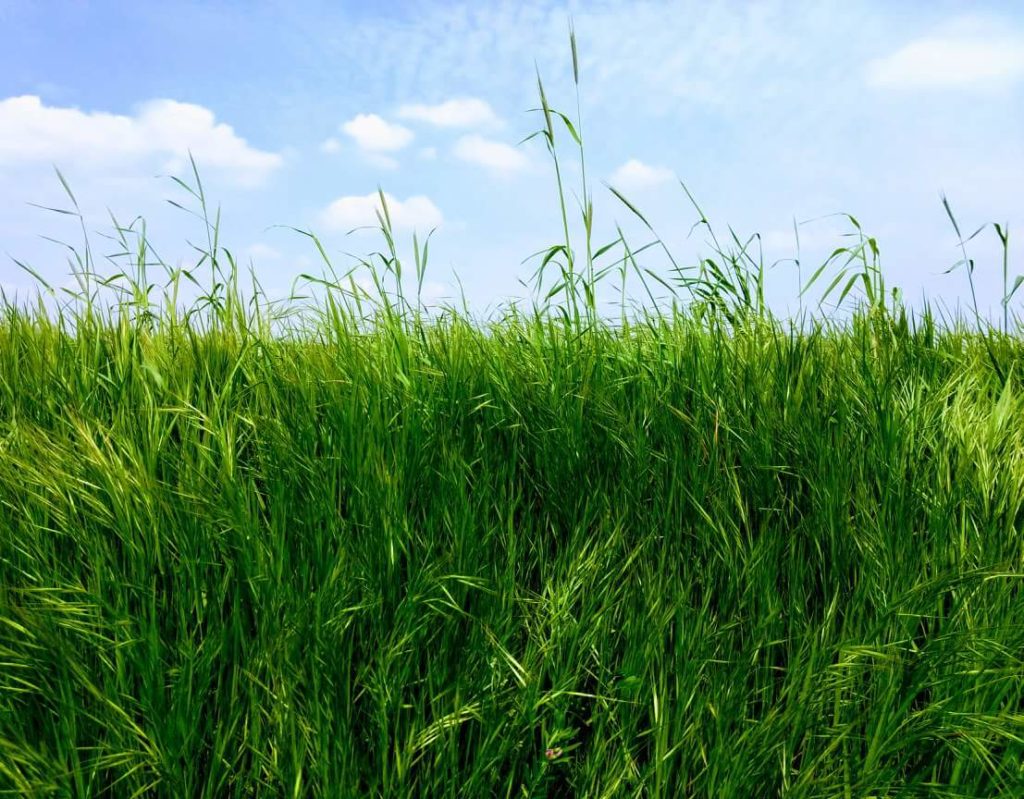
There’s no rushing when you walk, no fast forward to the finish line. There’s only the slow rhythm of one step after another, of knowing, trusting, that eventually you will get there.
In the near distance, on the way from Santhia to Vercelli, I spot the cool shade of a building on the outskirts of Vercelli. I am exhausted, drenched in sweat, and desperate for something cold to drink, but I know that increasing my pace will only exhaust me further. I can only be calm, patient, and grateful for the strength of my legs, my heartbeat, and for the flow of oxygen through my lungs.
Sometimes when I see a train pass I catch myself thinking twenty minutes later, That train has traveled further in the last twenty minutes than you’ll walk all week. I find myself laughing at the craziness of it all. But then, inevitably, I get distracted by a gaggle of goslings or a field of poppies and the thought vanishes.
Walking changes your relationship to time and space and your place in it all. One evening after too-many aperitifs and before dinner, a group of friends and I were staring into the horizon when we noticed a walled city on a distant hill.
“Isn’t that San Gimignano?” one of us said.
“I think it is,” someone else said.
“We’re walking there tomorrow.”
It looked so tiny on the hill. So tiny and so far away yet still so close. It was a bizarre moment, that sudden realization of how we, as walkers, as humans, are slowly moving through the universe at a snail’s pace across the landscape, and how arriving at a new place is, in the end, something we’ve earned. We’ve earned it by taking 40,000 steps. We’ve earned it through the small scrapes, blisters, and bruises that cover our bodies. And the next day, as we leave one town and move on to the next, that same earned town we saw on a hill the day before dissolves into the background, into memory.
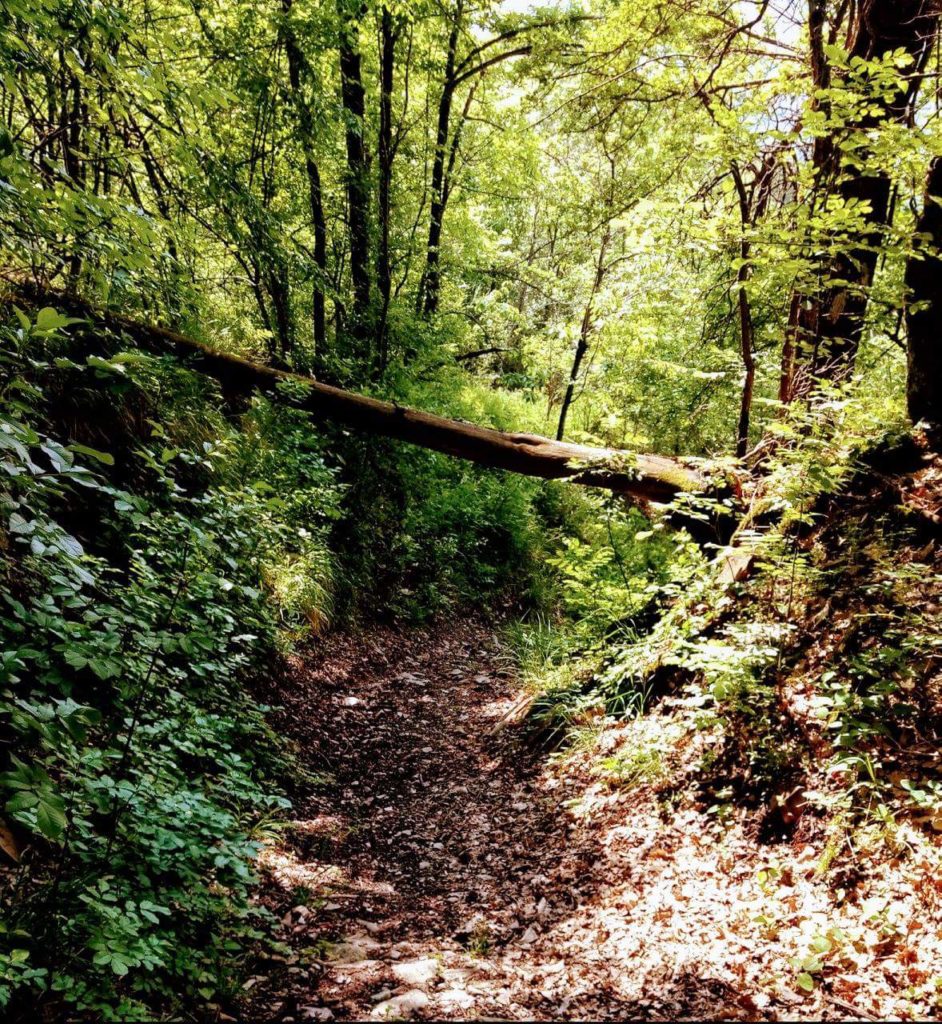
It takes some time, but Junior and I begin to bond. At a B&B I borrow a saw to hack off the bottom nine inches so he no longer towers over my head. In time, my thumb settles on the perfect nub, the sweat from my hand softens the wood, providing me with a feeling of comfort. Together we cross the Apennine Mountains; together we slog through the mud. Junior keeps me steady as I cross slick rocks in rivers.
After awhile he feels like an extension of my body, and when someone asks me if I’ll leave him behind after we cross the mountains, I can’t fathom the idea. “Junior is coming all the way to Rome with me,” I say.
Yes, Caty. You’re right. Stick love is real.
When you’re a pilgrim, you exist in this strange parallel universe to the world around you. You sleep on pilgrim time. You eat on pilgrim time. You wash your David Bowie t-shirt in the sink every night so that you can wear it again in the morning, and you feel like no matter how many times you shower you’ll always be a little bit dirty.
When we pass through through towns, Junior and I get a lot of stares. It’s impossible to be invisible. Walking in towns, I feel like a giant, smelly puddle. I am aware of how clean everyone is, coming from or going to work, sitting at cafés in stylish clothes, smoking cigarettes and sipping Aperol Spritzes with friends.
Junior and I, on the other hand, look like we’ve just crawled through the mud under a thorny bush while coming down from a mountainside, which, if I’m honest, we probably have. But, for the most part, the stares lack judgment and instead are full of curiosity and admiration.
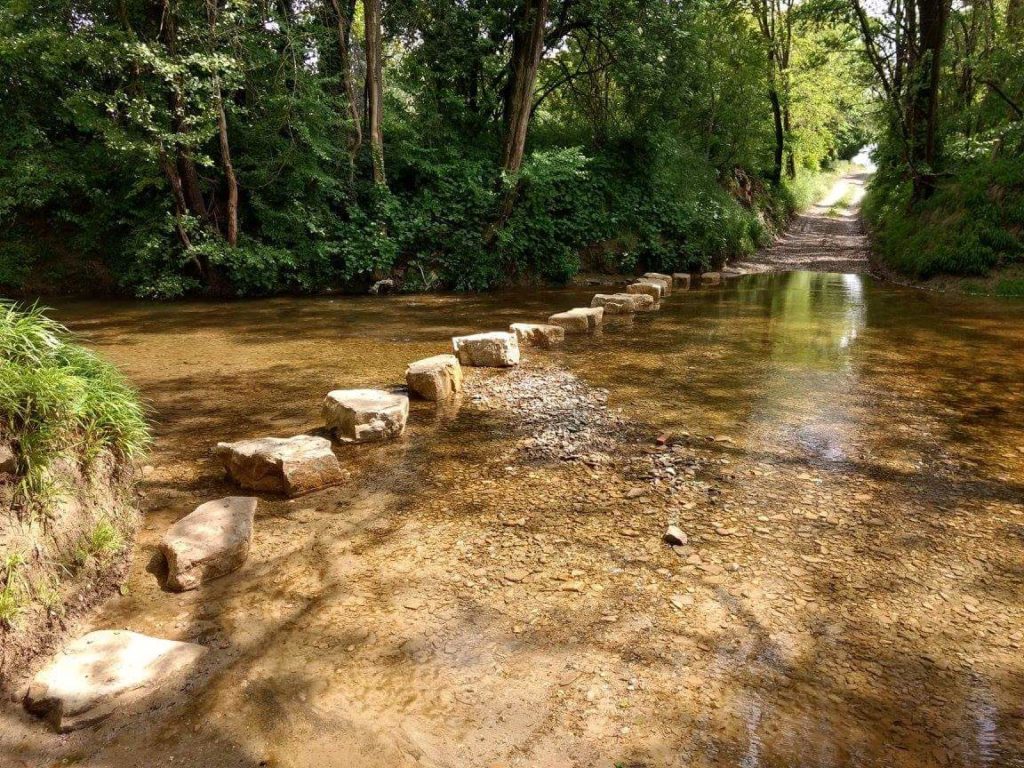
The locals stop me daily, sometimes multiple times a day. They are intrigued by me. They want to know where I’m from, where I started walking, where I’m going, and whether or not I’m alone. A man in Aosta Valley offers me a ride to Rome. A woman named Christiana invites me inside for a cold glass of water; when she asks if I need anything else I thank her and tell her that the water means everything. And it does.
An elderly man stops me on my way out of Pavia, and when I can’t understand him, I leap into my script, Sono Americana. Vado da Aosta. Vado a Roma. Sono solo. It turns out, though, that he simply wants to know the time, and as I show him the time on my cell phone, we giggle together at my confusion.
A young woman named Carla steps into the road when I pass by on my way out of Vercelli, and we talk for twenty minutes, taking selfies and trading contact information. Later that same day, Barbara and her parents invite me inside their home, and tell me stories of pilgrims they have met through the years. When we run out of shared words, we exchange our lives through photographs and smiles.
On April 25th, Liberation Day in Italy, I meet two women a few kilometers outside of Vercelli who are visiting the gravesite of a soldier. A husband. A grandfather. I am hot, sweaty, and exhausted, but I stop to hear their story and to share mine. As I keep walking across the rice fields I see a small crowd gathered around a marble memorial to the fallen man.
But like the mountains, and like the towns, the people I meet soon drift into the mist, and when I turn around again, they, too, are eventually gone. I wave back at their spirits, expressing my gratitude at their kindness. I carry them with me. I carry them on The Way.
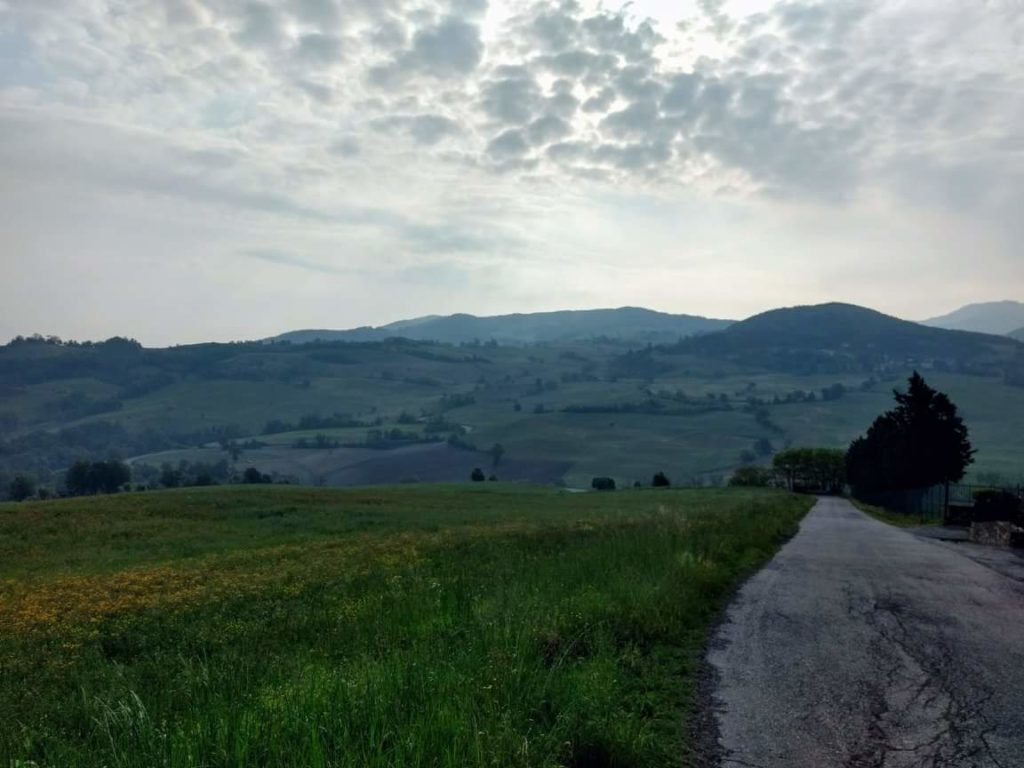
I sometimes meet other pilgrims, either on the trail or in the evening at the ostello, and sometimes I walk with them for a few hours or a few days. Though we all come from different worlds, on the road, where we come from is irrelevant to where we are, and who we are, in the now. There is no judgment, no exchange of trivial details about work or wealth; there is only walking, there is only The Way, which unites us by connecting our dirty boots to the earth. We walk in the footprints of those who came before us and leave our own legacy for those who come behind.
And while I cherish the friendships I make along the way, mostly it’s just me and Junior, alone on the road, crossing mountains and rivers, passing through fields and towns, creating our own rhythm. Tap! Two, three, four. Tap! Two, three, four.
The world is so large, and it it I feel so small, but when I am walking I feel like I’m a part of it.
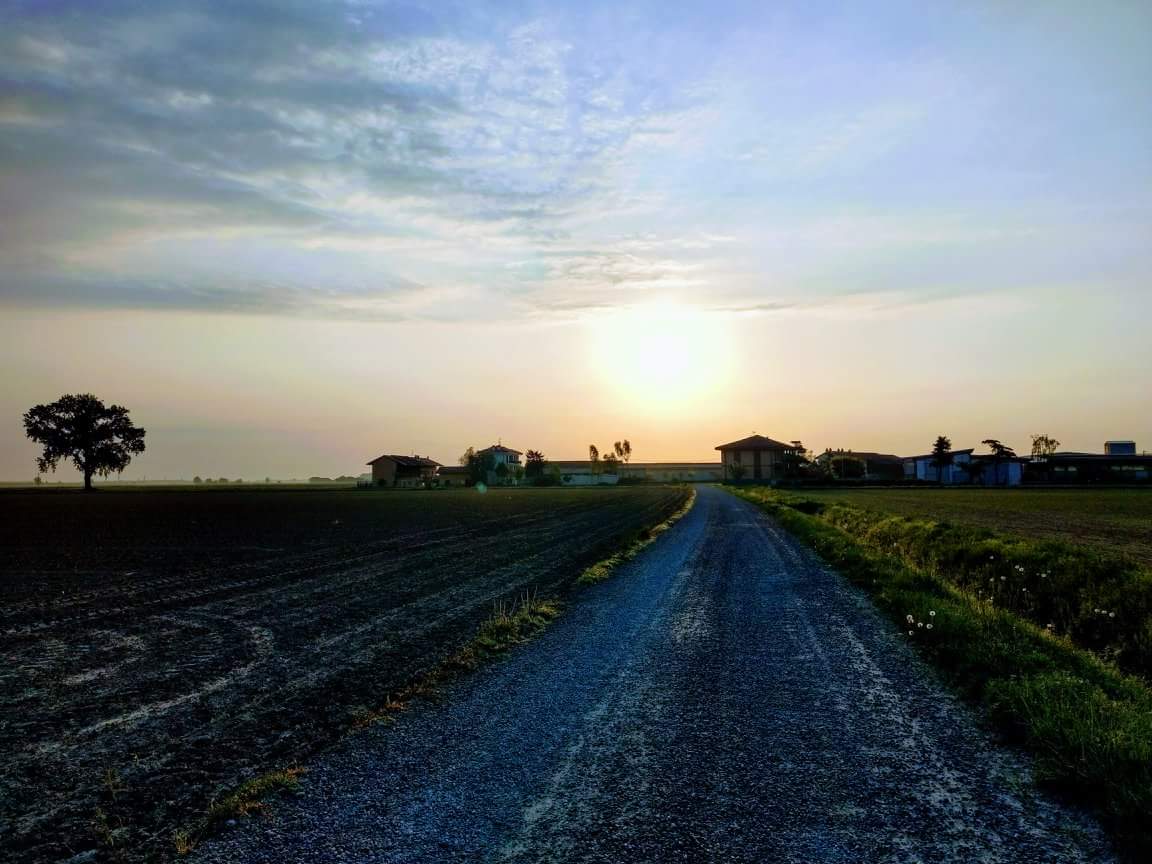



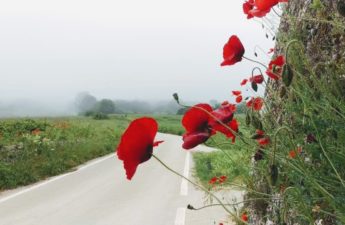
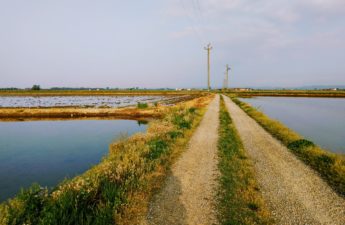
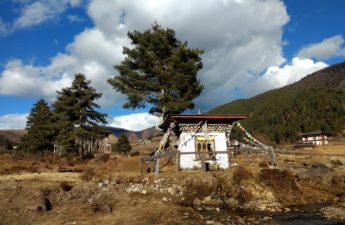
Stick love is real.
And that state of “all-in” walking, of being a walker, is deep. I’ll be chasing it forever. Caty camina. It’s what she does.
This year, when I hurt my back and couldn’t limp more than 3 blocks, I almost lost it. I was beside myself. I had taken walking for granted again, and then for months it was almost gone.
When I was finally able to really walk again, I could hardly stop. My first hour-long walk along the water, I cried I was so happy to have it back.
I so feel for you on those crutches. You will heal, but waiting is so, so hard. In the meantime, you have new walking-hobbling buddies. They’re doing their best, even though they know you don’t want them there. I have a little love for them, too.😉
I love every word of this, Caty!
Oh, I so knew you’d get this! One of my friends on the VF said that he thinks everyone should go walk for at least two days. It’s such a difficult thing to explain, as the feeling is so deep and intangible.
I’m trying to celebrate the good moments in all of this — the moments that I’m getting to have that I wouldn’t be having were I not my usual mobile self. But it’s hard. I want nothing more than to just take off and roam this big, crazy city — see where my feet take me — but every step is a challenge. I know it’ll come back, just as it did for you. And this vantage point that I’m experiencing is teaching me a lot about myself and the world.
Really enjoyed this chapter of your journey. Hope you and Junior can make it to Rome safety. And yes stick Love is real. You really miss it when it’s gone! Keep walking and writing!
Sadly, with my fractured metatarsal, my journey to Rome is (at least in this chapter) no longer. But I did manage to salvage the top 18 inches or so of Junior to keep with me and bring home. I miss walking so freely every day, but I’m working on finding other new joys. Thanks for reading 🙂
Oh, this is wonderful — I’m so glad you were able to write it as if you were still on the Way. (And you are…it’s just going to take a few years longer than you originally thought!) I miss walking so much — like Caty, I took it for granted. But you and I will both get walking again, and you’ve given me inspiration for the future! (Plus I still have your guidebook.)
It’s an interesting thought, taking walking for granted. But yes, I think it’s something we can’t truly understand the value of until it’s gone, perhaps because it’s something we do without thinking much about it; it’s such a natural physical act.
Funny thing about writing this is that I was composing much of it in my head as I was walking; breaking my foot just postponed putting it down on paper. (I did have to resist a bit working my foot into the piece, but I really did want it to be about walking more purely, so I hope that came through!)
It did, don’t worry!
I loved your writing! I want to be a Pellegrina, too. I’ve had some of your feelings, but none wandering alone—except in my home neighborhood and in city neighborhoods when traveling but in small sweeps.
I love your explanations of stick love. I suspect Junior will accompany you on your finally successfully trekking into Roma—along with Dumbledore III in the not so distant future.
Junior (or at least the top few inches of him) will accompany me home to California at the end of the summer. I just couldn’t leave him behind (especially after carrying him through the hospital in Siena — a great source of comfort, like a security blanket).
You have a wanderer’s soul, for sure. I don’t think it’s about a set amount of distance but rather a mindset — though there is something amazing about that long haul journey, the rhythm that comes with that. Hopefully that came across to you in this!